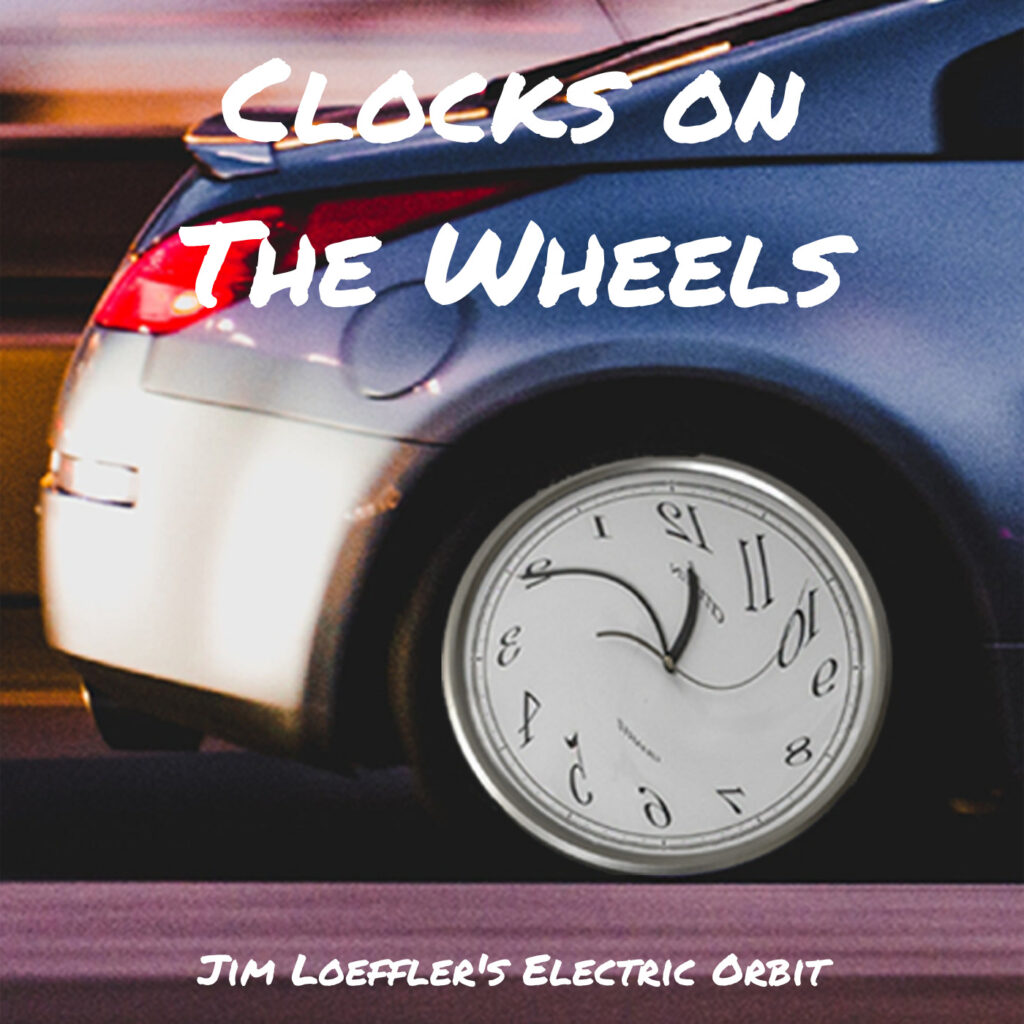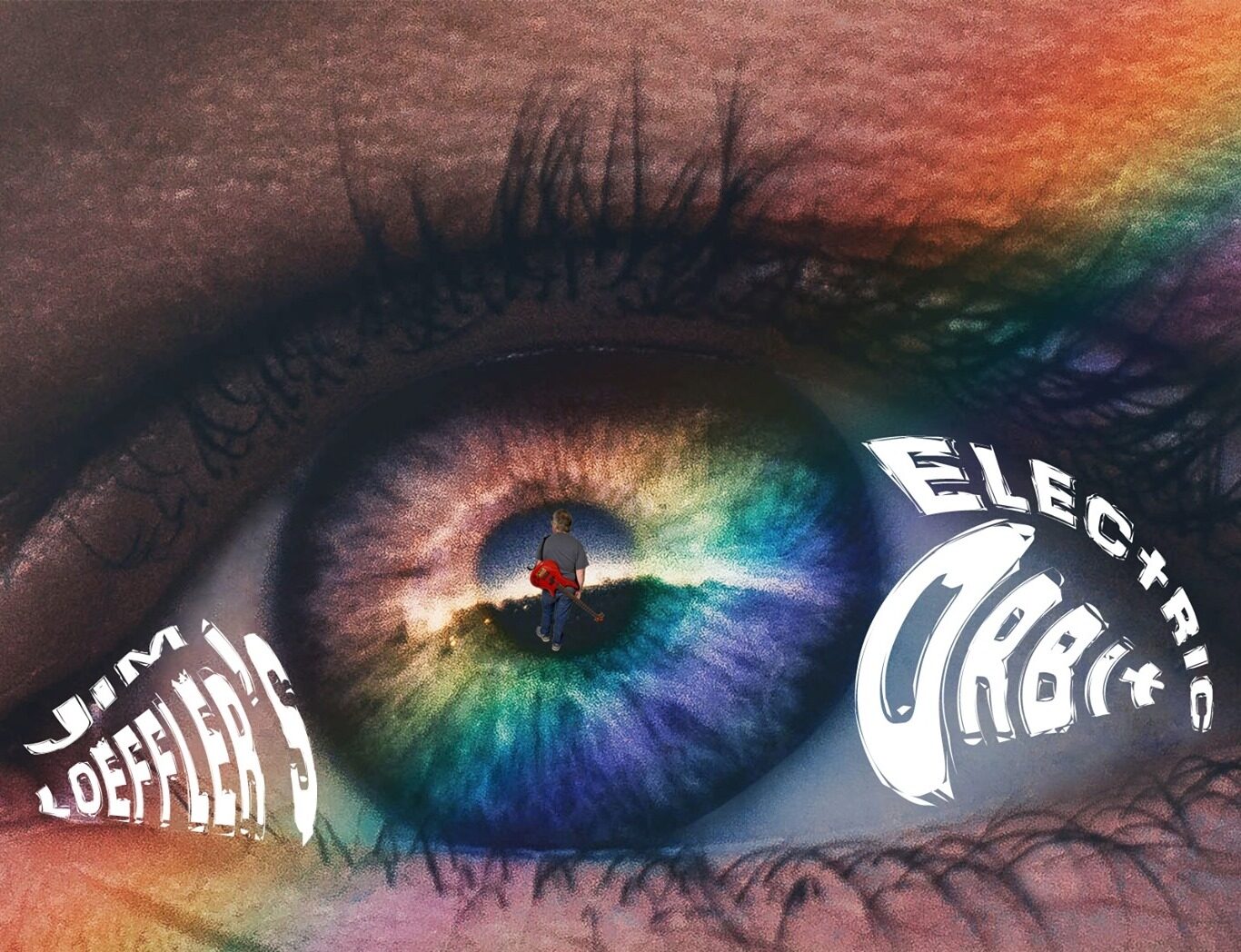The entire three and a half minutes of “Clocks on the Wheels” are nonstop rock ‘n’ roll. This song has elements of Slade, Oasis, and early Stones. A blistering solo is followed by a wall of guitars, harmonies, and an unrelenting groove before coming together at the conclusion. Check out the exclusive interview below:
1. Can you tell us a bit about where you come from and how it all got started?
JIM LOEFFLER’S ELECTRIC ORBIT: Well, I grew up in a very musical family here in Pittsburgh. My Mom had a professional light opera career and cut ’78 (rpm) records. My Dad taught himself piano, violin, viola, cello and banjo. I’m the youngest of five and we all played an instrument as well. So there was seldom ever any silence in our house. My Dad started recording instrumentals of old standards and a few originals and handing out CDs to friends, and as the DIY movement gained steam with better technology, I started exploring how to do the same with my songs. Up to that point I was just using a mic and a tape deck to get my ideas down.
2. Did you have any formal training or are you self-taught?
JIM LOEFFLER’S ELECTRIC ORBIT: I’m self-taught. I started playing bass, which is my primary instrument, and I know enough to be dangerous on acoustic and electric guitar, as well as piano. I can’t read music, I just play by ear, like everyone else in my family. Although I played the baritone horn in the school band, I kind of glommed on to whatever the Tubas next to me were playing and followed them, rather than trying to follow the sheet music on the stand. It worked great until one day we were rehearsing, and everyone just stopped. The Band Director broke the silence by pointing out that I had a sixteen-note solo heading into the next movement. I think that’s the only time I learned to play from sheet music!
3. Who were your first and strongest musical influences and why the name ‘JIM LOEFFLER’S ELECTRIC ORBIT’?
JIM LOEFFLER’S ELECTRIC ORBIT: Oh, I grew up listening to the Big Four from the Sixties: The Beatles, the Stones, the Who and the Kinks, thanks to my older brothers. Deep Purple was a major influence as well. So those bands and songwriters continue to have a huge bearing on my songwriting. More recent influences are Oasis and The Fratellis. I think Noel Gallagher is the finest songwriter of my generation. Why the name Jim Loeffler’s Electric Orbit? Well, I’ve been in other bands where the direction wasn’t always necessarily to my liking – certainly not a unique situation! I wanted to put my name on whatever I did, because succeed or fail, it’s down to me. The “Electric Orbit” puts out a high-energy vibe. And I think you can hear that in “Clocks on the Wheels”.
4. What do you feel are the key elements in your music that should resonate with listeners, and how would you personally describe your sound?
JIM LOEFFLER’S ELECTRIC ORBIT: I think listeners will come to realize that there’s always something positive in my songs, no matter the subject. I mean, you’ll always find me somewhere between The Struts and Nine Inch Nails! But much closer to The Struts. I try to blend a kernel of experience with a lot of imagination in what I’m trying to get across. That’s what I’ve learned and I what I know. Musically, I don’t like to repeat myself, and although I’ll never stray too far for too long from guitar rock, I will take chances here and there. That’s what makes it fun and really satisfying for me, and I think that comes through in the music.
5. For most artists, originality is first preceded by a phase of learning and, often, emulating others. What was this like for you? How would you describe your own development as an artist and music maker, and the transition towards your own style, which is known as ROCK?
JIM LOEFFLER’S ELECTRIC ORBIT: Since John Entwistle is my favorite bass player, I was heavily influenced by the Who. In that respect, I do have a bias toward the bass having very strong lines throughout my songs. Ray Davies and Paul McCartney really influenced me in terms of not only their lyrics and how they said what they said, but also their song structures. To me, they’re the gold standard in bridges or middle eights that take you in a completely unexpected direction. And all of these guys – Townsend, Davies, Lennon & McCartney – know the power of space, you know, what to leave out.
6. What’s your view on the role and function of music as political, cultural, spiritual, and/or social vehicles – and do you try and affront any of these themes in your work, or are you purely interested in music as an expression of technical artistry, personal narrative, and entertainment?
JIM LOEFFLER’S ELECTRIC ORBIT: I think every artist is free to express their views, whatever they are, in their music. Say whatever you want to say – on either side. Where I have a problem is when the artist gets ahead of their art – that is, when they start preaching and become known more for their politics or social causes than their music. That’s where I tune out. Articulating a view is fine in a song, but don’t preach from the stage. Don’t tell people what to think. Let everyone think for themselves.
7. Do you feel that your music is giving you back just as much fulfillment as the amount of work you are putting into it or are you expecting something more, or different in the future?
JIM LOEFFLER’S ELECTRIC ORBIT: Absolutely. I am having more fun than a human being should be allowed to have. What I’d love to do is start connecting with listeners on a wider basis. I’m just really excited for the future and where my music might take me.
8. Could you describe your creative processes? How do usually start, and go about shaping ideas into a completed song? Do you usually start with a tune, a beat, or a narrative in your head? And do you collaborate with others in this process?
JIM LOEFFLER’S ELECTRIC ORBIT: I don’t necessarily have a process. The only thing I know is that generally, music comes before lyrics. Melodies or basslines just pop into my head – at all hours – so I keep my phone handy to hum, sing, whistle, or play whatever it is. Other times, I just start with a chord or phrase and see where it takes me. Some songs come really quickly, while others take years. Lyrically, words or phrases will come to me, and I’ll jot them down. The quick songs happen when I know what the song is about as the melody hits me, then it’s just a matter of coming up with lyrics that go with that. I haven’t done much in the way of collaboration, but that’s not to say I’m closed to the idea. In fact, I’ve got a couple of songs where I’d like to bring in other musicians, so we’ll see.
9. What would you consider a successful, proud or significant point in your life or music career so far?
JIM LOEFFLER’S ELECTRIC ORBIT: A big milestone for me was releasing my first album, “Shootout at the Straw Man Factory”, in 2021. So much work went into that – writing, performing, arranging, mixing and producing. I learned so much during that, and continue to learn every time I put out a new song.
10. Do you think is it important for fans of your music to understand the real story and message driving each of your songs, or do you think everyone should be free to interpret your songs in their own personal way?
JIM LOEFFLER’S ELECTRIC ORBIT: I think it all depends on the song. Some of what I write is fairly straightforward, in that if you listen to the words, the meaning’s pretty obvious. For most, however, there’s much more room for the listener to take from it whatever they want. Maybe there’s only one line in a song that they take away. Great.
KEEP IN TOUCH:
FACEBOOK | INSTAGRAM | TWITTER | SPOTIFY | WEBSITE | YOUTUBE

